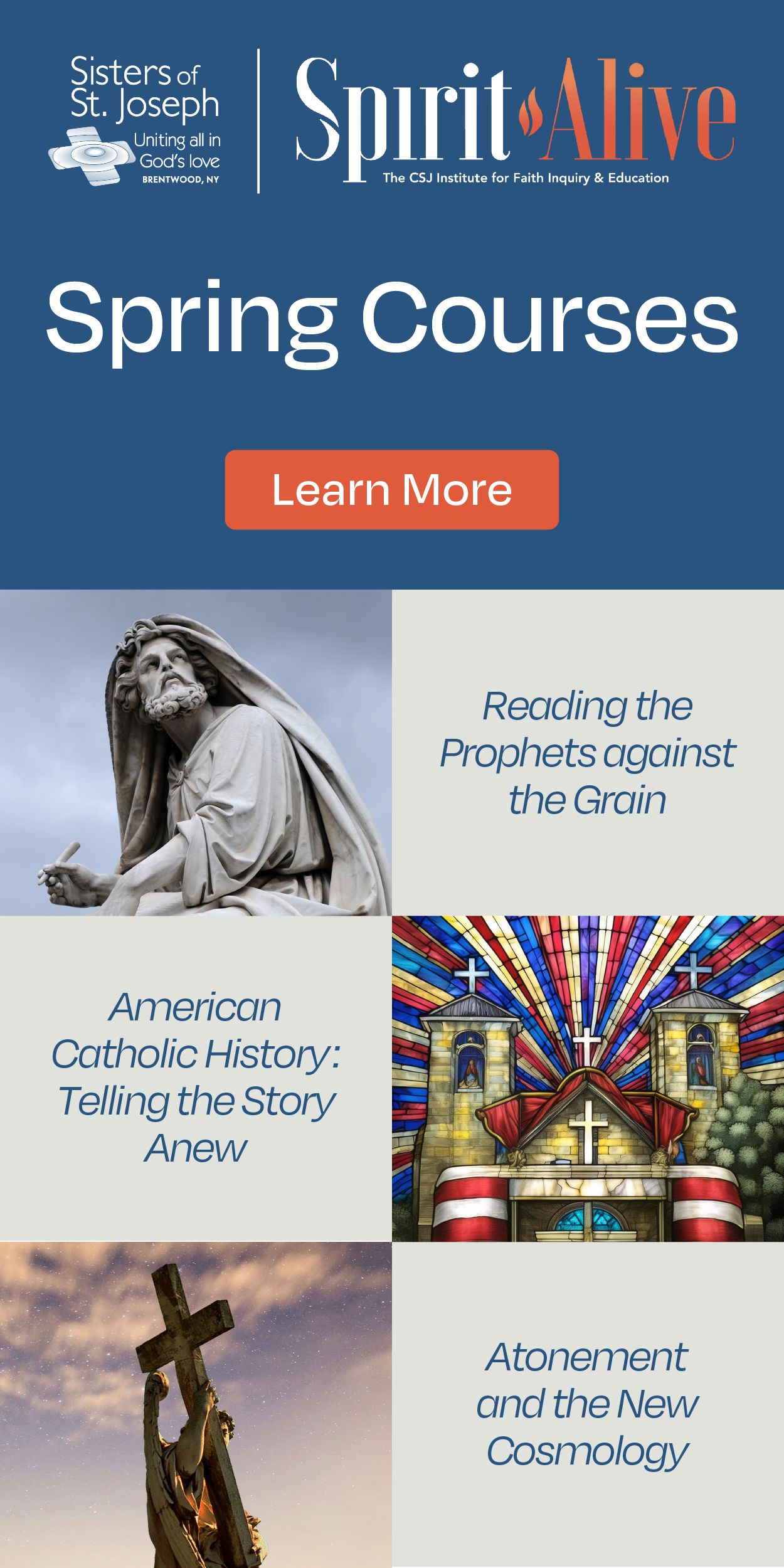This Jesuit had to confront what he believed about God and suffering when his sister became a quadriplegic. But the letters of comfort were what really threw him for a loop.
At dawn on his birthday, October 24, 1988, Father Richard Leonard’s phone rang. It was his mother, telling him that his sister Tracey had been in a terrible car accident. Her neck broken and her spine crushed, Tracey became a quadriplegic at age 28.
That’s why Leonard, a Jesuit who lectures worldwide on film and faith, was blown away when he read the letters that friends and acquaintances sent his family. Some claimed Tracey must have offended God; others said God had blessed her by sending such terrible suffering her way.
Meanwhile Tracey was asking her brother to kill her.
From this furnace of suffering, Leonard wrote Where the Hell is God? (Paulist Press, 2010) in which he scrutinizes our attempts to make sense of God’s role in human misery.
How did going through the tragic situation with your sister influence your views on God and suffering?
My sister’s accident brought home the old question: Why do bad things happen to manifestly good people? It was a very challenging thing for my own faith, as anybody who’s been through any traumatic event would agree. Writing Where the Hell Is God? was, first of all, my attempt to grapple with that reality.
Do you pray for your sister?
Most of my prayer is in thanksgiving that we still have her. I’m just grateful we’ve got her, because in the beginning she wanted to die, understandably. One of the things she begged us to do was to kill her. And it was frightening to realize that I thought seriously about killing her. I’ve got a high distinction for medical ethics from Jesuit Theological College. I know the church’s teaching on euthanasia. And I know the civil law in your country, which is the same as it is here in Australia.
I support those teachings and laws more than ever before. I have to support them because I can tell you that it is challenging when somebody you love is begging you to help her die because this life is not worth living.
She would say, “I’m washed, fed, turned, toileted, and clothed every day and I’m 30 years of age. Would you want to live like this?”
I’d say, “No, Tracey, I wouldn’t.”
And she’d say, “Well, why the hell are you asking me to? You all give me a great speech about how it’s all going to be fine, and walk away.”
After weeks and months of this, your judgment gets so cloudy. That’s why I think the church’s teaching is so right, and the legislation is so right, because it puts a brake on some runaway emotions.
Since then Tracey has come to some peace and reconciliation with her life. She’s written her own book, The Full Catastrophe (Paulist), in the hope that others might be inspired to live life to the full.
My prayer for my sister is to be so grateful for all the people surrounding her. My mother has borne the heat of the day for 24 years. My mother is 80 now, and she gets up at midnight, 3 a.m., and 6 a.m. every night to turn her now 50-year-old daughter, and has done so for 24 years, since Tracey came home after a year in the hospital spinal unit.
Now, if you want to see an intervention of God, it happened at 3 o’clock this morning. My brother and his family have also been extraordinary, as have her friends, who have remained so faithful for 24 years.
So my prayer for Tracey is—well, I’d love a miracle, so I’m not excluding that, but it’s also about thanking God for people surrounding her, and for her witness to the human adventure, which has been so extraordinary.
What did people write to your family after your sister’s accident?
People were trying to be comforting. But they wrote some of the most frightening letters that we could ever imagine.
People wrote and said, “Tracey must have done something terrible to offend God. And God has had to punish her in this life, because God will not be mocked.” One of our correspondents actually wrote us that. As though even if we, her family, didn’t know what Tracey had done, God knew what Tracey had done, and she merited this punishment. This view is a lot more alive and well than any of us in the church would imagine.
Infertile couples, for example, will often express their anger and pain in language like, “Why can’t we have a baby? Why has God done this to us?”
There is a belief that God actively intervenes to punish us or correct us through physical or other ailments, difficulties, or traumas.
The second group of letters were from people who said, “Tracey must be sending up beautiful blocks to heaven, where she’s going to have a mansion in the sky when she dies.” In theology we call this “pie in the sky when you die” theology.
That’s pretty frightening, too, because are we seriously going to take the metaphor of “There are many rooms in my Father’s house” of John 14:2 so literally that now we’re actually sending up “building blocks”? When I’ve challenged this, I’ve discovered that for some people this is actually part of their visual imagery. That isn’t their fault, but its application ends up being fairly difficult.
The third group of letters showed a very common response—at least for Irish Catholics, although I don’t think we have a monopoly on it: “You are really very blessed,” we were told. I love how people not going through your situation know how blessed you are. But they said we were very blessed, “because, remember, God only sends the biggest crosses to those who can bear them.” I had never thought of that theology before I started getting these letters.
So these folks believe the more you suffer, the more blessed by God you are?
Right. If you stop thinking about it personally and think about it socially, then a country like Bangladesh ends up the most blessed country on God’s earth, because it’s in the bottom five of every single human welfare indicator in the world. I don’t know anybody who’s going to seriously argue that.
The fourth group of letters were from people quoting Isaiah 55: “My ways are not your ways and my thoughts are not your thoughts.”
While that’s true—that God’s thoughts and ways are above our ways and thoughts—ultimately when that’s applied to suffering, it becomes a denial of the incarnation. I thought the whole point of the incarnation was that God’s ways are somewhat our ways and God’s thoughts are somewhat our thoughts.
I don’t think—just because the going gets tough—we can then turn to an inscrutable God who is totally unknown. I thought the point of the Christian revelation was that in Jesus Christ we do know God and God is accessible to us, not totally unknowable and inaccessible to us.
And then finally we were just told: “Well, it’s all a mystery and we’ll only find out in heaven.” I don’t like saying it is a mystery. Suffering is deeply mysterious at one level. But if the best we can say to one another when the going gets tough is it’s all a mystery, I think we’re in trouble.
Since writing this book, I’ve discovered that lots of people have actually walked away from their faith over deep trauma in their life. I’ve received extraordinary correspondence from people who are in pain, for whom throwaway lines and quick solutions and quoting scripture somehow is meant to do the job. In actual fact, it alienates them from faith.
Those people who wrote you those letters—what do you think their image of God is?
It’s not their fault, but I absolutely think that some Catholics have a tyrannical God in their head. It’s a strong word to use, but they do. I saw it even in some people’s response to my book. They’d say, “How dare you say that God doesn’t send suffering, doesn’t kill us off, that it isn’t just all God’s design?”
That’s fine if you’ve gone through a smaller personal suffering. But what if your family got wiped out in the Holocaust? One woman wrote to me recently, a Christian woman from Australia whose three children were killed in the 2004 tsunami in Indonesia. She said, “As I saw them go, my faith went with them.”
She said that her minister, of another denomination, told her, “That’s the will of God. It isn’t until you get to heaven that you’ll discover that God has a major purpose for that to have occurred.”
Now that’s a very traditional Christian response, but it’s totally inadequate. What lies behind that is a God who is tyrannical in the sense that he has a bigger purpose, which he doesn’t let us in on. We have to just trust and believe. I don’t know that you love a tyrant. Some people just survive the regime.
There are some Catholics who are profoundly frightened of God. The way that it all fits for them is that God has a purpose. God sends everything, and God sends bad things.
But there’s a big difference between God permitting evil in the world and God enacting it.
That’s one of the tough things, that tyrannical image of God. I’m very happy to give that a good shake, because I can’t reconcile it with Jesus Christ, who says, “To see me is to have seen the Father, and the Father and I are one. I do nothing on my own.”
The profound and absolutely primal Christian belief is that Jesus is the face of God. And he’s not tyrannical.
Isn’t there also some biblical evidence for the tyrannical image of God?
In the Hebrew scriptures we find the most tender, most loving, most wonderful images of God. It’s quite wrong to say the tyrannical or vengeful God is the God of the Old Testament. It’s not true.
There are, however, some parts of the Old Testament in that vein, and they do seize the imagination. But when we look at Jesus, we don’t find any of that revenge or retribution. Jesus got angry; he challenged and confronted people. That’s very different from certain instances in the Old Testament where God sends down disease, famines, or other curses upon the people.
Jesus is quite the opposite. We find him saying: Turn the other cheek, forgive your enemy, if they ask for one cloak give them two, go the extra mile, all of those images. That’s a departure. So when you look at the actions of Jesus and the person of Jesus, you don’t find that same level of retribution and revenge that sometimes occurs in the tyrant that is some people’s model of God.
So how do we affirm God as the creator of hurricanes and tsunamis, and not let God be the tyrant in control of the thing?
It depends on to what degree we think God is controlling it. John Polkinghorne, the great English physicist and Anglican priest at Cambridge, says that creation is still evolving. St. Paul talked about how creation was in the act of giving birth, that it’s groaning in labor pains. Paul didn’t know anything about evolutionary biology, but he knew something about how the world was still in process.
So why would a tsunami happen? Because the earth shelf moved. I certainly don’t need an image of God saying, “I need a tsunami now, and I need it for a particular purpose.” That would be like a puppet master who is pulling our strings.
We’re told we are the apple of God’s eye, that we’re the deepest expression of God’s desire for the world. I find it frightening theology then to think that through no fault of our own, totally defenseless people are done over by God for some greater plan.
I can’t reconcile that with the face of God we find in Jesus Christ. So I think it simply has to get challenged.
People who hold on to a tyrannical God—I wonder how they love God. I’m just not sure I could love that God. And I’m not sure I could ultimately believe that God loves us.
Is there a way to reconcile the fact that yes, creation groans, and yes, earthquakes happen, but God is still a God of love?
God has to take some responsibility for creating a world that is less than perfect. Or else it would be heaven, because only the perfect rests in heaven.
It is also true that we humans need the energy of creation. Creation seems to be in such a fine balance that we have to first learn a way to live with it, second to use the intelligence and ingenuity we’ve got, and third to learn from our mistakes. We’re getting there on the first, but I’m not sure we’re very good on the second or third. We’re a bit sparing in ingenuity in the upper echelon until a crisis happens.
For years before the tsunami, for example, the poorer countries of the Indian Ocean had been asking for an early warning tsunami system, which was already operative in the Pacific and in the Atlantic, where much wealthier countries exist. It’s very expensive technology, and they didn’t have it at the time.
They’ve got the early warning system now. It might not have saved everyone, but it would have been a big help.
But what I want to stop is this: people knowing that they live on a fault line where a massive earthquake will happen with loss of life and destruction of property, and then saying, “Why did God do this?” I accept that question in the general sense of God creating a less than perfect world. But we are deciding to live on the fault line and, in a sense, to have limited learning from our mistakes.
I don’t know that this gets us totally around this problem. It always strikes me as strange that while this is one of the greatest areas of theology, it’s one on which the church has not spoken definitively. I find that fascinating.
What about a more personal situation, like your sister’s accident or someone whose child dies? Where would you see God in that situation?
I don’t see God sending bad things, because we do say in 1 John 1:5, “God is light, in him there is no darkness.” So God can’t have this stable of bad things.
I’m convinced that a lot of people think God is like a Harry Potter film. He’s generally quite good, but every so often he goes off to the Department of Dark Arts and he sends down terrible things upon the earth: “You’ll get breast cancer. I’ll kill your child.” Those parts of God are out of character, aren’t they?
Cancer happens because we’re not God, we’re imperfect, and we belong to a world where our bodies are prone to disease. We have finite resources, and we haven’t quite cracked the code of disease and recovery. Not to mention that resources are so unfairly managed and distributed throughout the world, so some people suffer a lot more than others.
So what’s our response to a parent whose child has cancer? First, we cannot believe that God sends the cancer, because that would mean there’s darkness in God.
As I’ve said, there’s a difference between “God permits a world in which cancer exists” and “God’s sending it.” We’re not good on that distinction, on making it, or maybe on believing it.
So where is God, then?
God is in all the health care professionals who did their work. God is in the love of that mother or that child. God is in the normal, extraordinary response that we evoke from family and friends, and God is present and active, incarnated, because we’re an incarnated religion.
God is incarnated in everyone and everything that works toward that child’s recovery. If the child recovers, we’re very happy to give God credit. We should, because God’s given us the intelligence, the care, the love, the maternity to see us through that absolutely terrible chapter.
If the child dies, then I will not stand at that child’s funeral and say, “Well, this is God’s will, but we just don’t know why God did this.”
I’ve heard priests do that, and I just can’t be one of them. I would say that we’re going to be on this earth until, either by natural attrition or by accident, we’re going to die. Because that’s the way it is. We’re finite beings.
The other thing I hear when a child dies of cancer is, “God must have needed another angel in heaven, so he’s taken your baby home.” People are trying to be comforting. I’m not blaming them.
But I can’t tell you how many mothers have told me that they’ve looked at that page in my book and started weeping, because that was said to them by their mothers or pastors or the pastoral care people at the hospital, who were saying the best thing that they could. But these mothers were so angry with God.
God doesn’t “need” anything. We say that God is sufficient. God’s desire, we hope, does not include killing babies with cancer. If that’s not part of God’s active will, then we need to have something else to say.
I know it sounds a bit tough. But surely we can say something like, “God has created us as fallible, weak human beings.” That’s the way we are. And by natural attrition or by accident this body will exist until it doesn’t.
But it is important that we say that God is with me at every moment of life’s drama, at every step of the joy and the sorrow. God is my companion, my friend, the one who is totally committed to my life. When I die, I fall into the arms of God. I love that image of God being there at life’s end.
This article appeared in the April 2013 issue of U.S. Catholic (Vol. 78, No. 4, pages 26-30).
Image © hikrcn – Fotolia.com
















Add comment